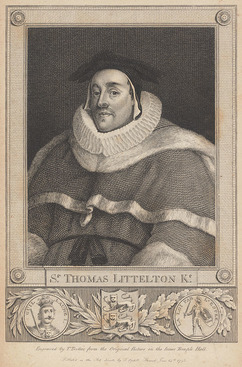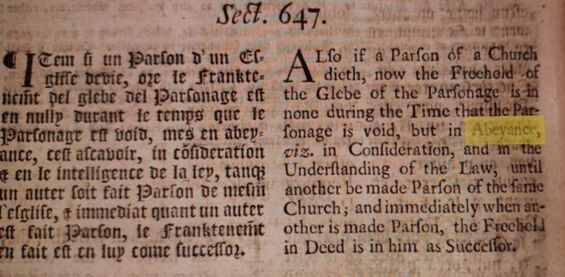
Authority Cited: Littleton
Author name and dates: Thomas Littleton (also Lyttleton) (c.1407-1481) also, de Littleton
BKG Bio-tweet: Lawyer; Judge; first text-book on English law of property; early ed.: Norman-French and English phrases; still referenced
Categories (list of works cited – preliminary) [BKG Note: two T. Littleton cites in 1755 Dict. vol. 1. No T. Littleton cites were identified as added in the 1773 Dict. SJ latter contributes to the Chambers Law Lectures, including parts of the lectures related to Littleton per E.L. McAdam, Jr., Dr. Johnson and the English Law, 1951.]
Author name and dates: Thomas Littleton (also Lyttleton) (c.1407-1481) also, de Littleton
BKG Bio-tweet: Lawyer; Judge; first text-book on English law of property; early ed.: Norman-French and English phrases; still referenced
Categories (list of works cited – preliminary) [BKG Note: two T. Littleton cites in 1755 Dict. vol. 1. No T. Littleton cites were identified as added in the 1773 Dict. SJ latter contributes to the Chambers Law Lectures, including parts of the lectures related to Littleton per E.L. McAdam, Jr., Dr. Johnson and the English Law, 1951.]
- Treatise on Tenures: The first part of the Institutes of the law of England; or, A commentary upon Littleton, not the name of the author only, but of the law it self ... /Haec ego grandaevus posui tibi, candide lector, authore Edwardo Coke, milite; also three learned tracts of the same author: the first, his Reading upon the 27th of Edward the First, entitled, The statute of levying fines: the second, Of bail and mainprize: and the third, his Compleat copyholder; to the whole is added, the treatise of the Old tenures of the laws of England. The 12th ed., (carefully corrected from the errors of the former impressions) with two new tables; and many references to the modern law cases, never printed before. 1738, [London] In the Savoy : Printed by E. and R. Nutt, and R. Gosling (assigns of E. Sayer) for R. Gosling, and H. Lintot; abeyance (Sect. 647, p.342, see image below) (Dict.: "This word, in Littleton, cap. Discontinuance, is thus used. The right of fee-simple lieth in abeyance, when it is all only in the remembrance, intendment, and consideration of the law. The frank tenement of the glebe of the parsonage, is in no man during the time that the parsonage is void, but is in abeyance. Cowel."
- Littleton (no work cited); chivalry (in Cowel quotation)
